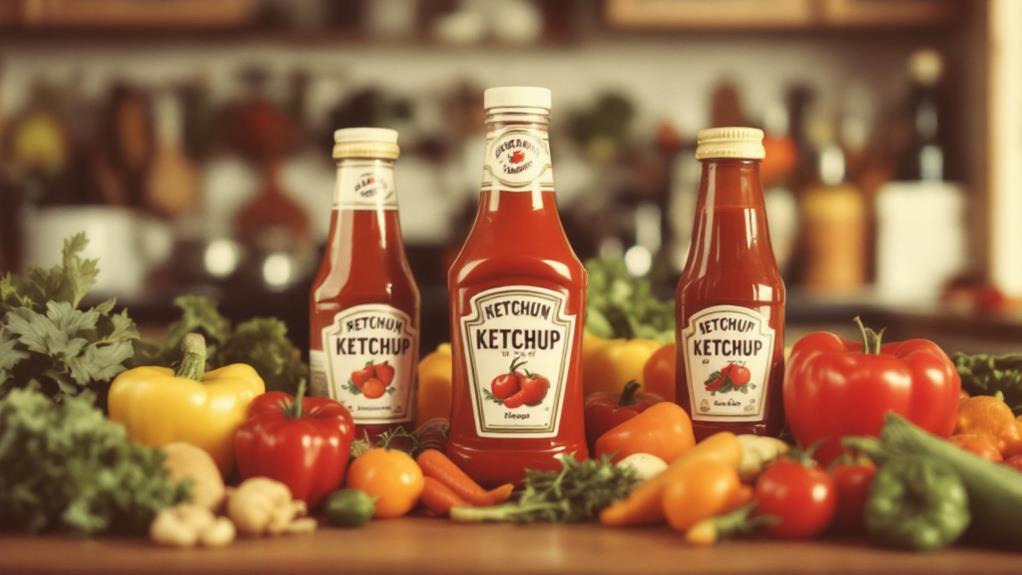Will Ketchup Still Be Considered a Vegetable? Exploring the Debate

No, ketchup isn't considered a vegetable today, but the debate around its nutritional classification is still relevant. In 1981, the Reagan administration suggested labeling ketchup as a vegetable to cut school lunch costs, facing immediate public backlash. Though the proposal was quickly retracted, the controversy set the stage for ongoing discussions about food policy and children's nutrition. Critics argue that such classifications dilute the quality of school meals. This debate underscores a broader clash between industry lobbying, political influence, and genuine nutrition standards. To uncover more about this complex interaction, exploring this topic further will be insightful.
Legislative Background
In 1946, the National School Lunch Act established the National School Lunch Program, mandating that meals meet nutrition standards by providing one-third of children's daily Recommended Dietary Allowances (RDA). Fast forward to the Reagan administration in 1981, and you encounter a controversial moment in school lunch history. Amid significant budget cuts to the School Lunch Program, a proposal emerged to classify ketchup as a vegetable. This move was part of an effort to adhere to the nutrition standards set by the original act while managing decreased funding due to the Omnibus Reconciliation Acts of 1980 and 1981, which slashed the Federal School Lunch budget by 25%.
The regulations surrounding what could be counted as a vegetable in school lunches sparked uproar. Classifying ketchup, a condiment, as a vegetable seemed to undermine the integrity of the nutrition standards intended by the 1946 legislation. This proposal faced widespread public outcry and was quickly retracted, highlighting the critical balance between maintaining nutrition standards and adjusting to budget constraints. It serves as a reminder of how political and financial pressures can sometimes complicate the pursuit of healthy, nutritious school lunches for children.
Nutritional Controversies
The debate over what counts as a vegetable in school lunches didn't end with the retraction of the ketchup proposal. It only intensified as nutritional requirements for school lunch programs continued to spark outrage and mockery. You might recall the Reagan administration's attempt to classify ketchup as a vegetable, which was quickly shot down. Yet, the controversy persisted when the USDA decided in the 1990s that concentrated tomato paste could qualify as a vegetable serving. This decision left nutrition advocates questioning the adequacy of these proposed regulations.
In 2011, the Obama administration tried to reverse the classification of tomato paste, but Congress and powerful food industry lobbyists pushed back hard. The two-tablespoon rule, which allowed pizza to count as a vegetable due to its tomato sauce, further fueled skepticism. Critics argue that allowing such ingredients to meet nutritional requirements dilutes the nutritional value of school meals. After all, these meals are a significant part of many children's diets. The ongoing debate underscores the need for clearer guidelines to guarantee that school lunch programs provide genuinely nutritious options rather than relying on technicalities that satisfy regulations but not nutritional needs.
Policy Changes Impact

Through ongoing policy changes, the impact on school lunches has been both significant and controversial. The debate over whether ketchup should be classified as a vegetable highlights the complexities of nutritional guidelines and the influence of Congress on these policies. In 1981, the USDA's proposal to designate ketchup as a vegetable in school lunches due to budget cuts faced massive backlash, ultimately leading to its withdrawal. This incident underscores how political and financial considerations can shape nutritional standards.
In 2011, Congress blocked USDA efforts to implement stricter definitions of vegetables in school meals. This action demonstrated the persistent political tug-of-war over food policy, where economic interests often collide with nutritional reform efforts. The classification of condiments like salsa as vegetables in 1998 further muddied the waters, complicating how schools meet vegetable requirements.
The Obama administration's attempts to change the status of concentrated tomato products faced stiff opposition from Congress, illustrating the challenges in shifting policy. Legislative amendments continue to grapple with the classification of tomato paste and similar products. These debates center on their true nutritional value, showing that policy changes in school lunches remain a contentious and evolving issue.
Public Reaction
Amidst the complex policy changes impacting school lunches, public reaction has played a vital role in shaping the outcome of these debates. When ketchup was controversially classified as a vegetable in 1981, it sparked significant public outrage. Critics quickly labeled the decision as one of those ridiculous regulations that undermine nutritional standards. The notion that a condiment could replace actual vegetables in school meals seemed absurd to many, fueling widespread discontent.
Senator John Heinz, whose family name coincidentally aligns with ketchup, stood firmly against the proposal. He highlighted the absurdity of classifying ketchup as a vegetable, stressing its role as a mere condiment. This stance resonated with the public, who saw the classification as an affront to genuine nutritional standards. Media outlets across the country ridiculed the decision, likening it to "The Emperor's New Clothes," which only amplified the discontent.
The backlash was so strong that the food policy was swiftly withdrawn within a month, underscoring the power of public opinion. The episode didn't end debates on similar topics, as future discussions on tomato paste and pizza evoked strong reactions, reflecting persistent concerns about children's nutrition.
Political Implications

How did a simple condiment like ketchup ignite such a political storm? The answer lies in the intersection of regulations, school lunch programs, and political agendas. Back in 1981, the USDA's proposal to classify ketchup as a vegetable sparked outrage. Critics saw it as a cynical move amidst budget cuts to school lunch programs, challenging the integrity of nutritional standards. The decision was quickly met with a fierce political backlash, led by Congressional Democrats, who denounced the proposal as absurd. Public outcry forced the USDA to retract the proposal, but the incident left a lasting impression on how political interests could overshadow children's health.
This debate over ketchup was more than just about school lunches; it highlighted the struggle between industry lobbying and public health priorities. It wasn't the last time tomato-based products would be scrutinized, as later attempts to classify tomato paste likewise faced political resistance. The saga underscores a broader dynamic where political decisions often prioritize industry interests over nutritional well-being. As you reflect on this, consider how such regulations can impact the health of students nationwide. The political implications of these decisions continue to shape the conversation around school meal policies today.
Nutritional Standards Debate
The political storm surrounding ketchup's classification as a vegetable in school lunches underscores a larger issue: the ongoing debate over nutritional standards. You might recall that in 1981, the Reagan administration proposed classifying ketchup as a vegetable to address budget cuts. This sparked public outrage and highlighted the complexities of food policy. The question remains if ketchup and similar products can genuinely meet the nutritional standards expected in school lunches.
- Nutritional Adequacy: Critics argue that considering ketchup a vegetable overlooks the vital nutrients that children need. The USDA's rules allowing concentrated tomato paste as a vegetable serving brought further scrutiny regarding nutritional adequacy.
- Political Influence: The 2011 attempt by the Obama administration to change these standards faced resistance from Congress, showing the influence political and industry interests have on food policy.
- Public Reaction: Each legislative attempt to redefine what constitutes a vegetable in school lunches has faced backlash. Public and media reactions often focus on the absurdity of classifying condiments as vegetables, raising significant questions about children's dietary habits.
The debate reflects broader concerns about how we define nutritional standards and the impact on children's health.
Historical Context

In the early 1980s, a controversial proposal by the Reagan administration aimed to classify ketchup as a vegetable in order to cut costs in school lunch programs. This move sparked outrage as it seemed to undermine nutrition standards by allowing a condiment to count as a vegetable serving. The USDA, tasked with implementing these changes, faced intense criticism from both the public and Congress. Critics argued that calling ketchup a vegetable was absurd and hypocritical, leading to the proposal's withdrawal within a month.
Fast forward to 1998, and the USDA's decision to classify salsa as a vegetable added another layer to the debate. This move indicated shifting perceptions of what could be considered a vegetable serving in school lunches. By 2011, the Obama administration sought to reverse allowances for concentrated tomato products like ketchup, aiming to improve nutrition standards. However, Congress resisted, highlighting the political complexities intertwined with public health objectives.
The ongoing debate over ketchup's status as a vegetable underscores broader issues in food policy. It illustrates how nutrition standards can be influenced by political agendas, affecting the quality of school lunch programs and, ultimately, children's well-being.
Expert Perspectives
Experts' insights reveal the complexities behind classifying ketchup as a vegetable in school lunches. The debate isn't just about if ketchup should be considered a vegetable but also about how food policies and regulations impact children's nutrition. Marion Nestle, a leading voice in food policy, criticizes the political motivations behind categorizing ketchup as a vegetable, suggesting that these decisions often put industry interests over the well-being of students. The controversial classification started in the Reagan administration when budget cuts led to proposals counting ketchup as a vegetable serving, sparking significant backlash.
Consider these key aspects:
- Historical Decisions: The 1981 proposal set a precedent for how vegetables are classified in school nutrition policies.
- Cultural Shifts: By 1992, salsa sales overtook ketchup, reflecting changing consumer tastes and challenging its vegetable status.
- Policy Changes: Both the Clinton and Obama administrations attempted to reassess these classifications, facing resistance.
Understanding expert perspectives helps you grasp why ketchup's classification as a vegetable remains contentious. These insights reveal not only the nutritional implications but also how school meal policies are shaped by broader regulatory and cultural forces.




